What Could Be
Unitarian Universalist Congregation of Columbia
February 25, 2018
Rev. Jeff Liebmann
Call to Worship
From Amos, Chapter 5
Hear this word, which I intone as a dirge over you, O House of Israel…you who turn justice into wormwood and hurl righteousness to the ground! …Assuredly because you impose a tax on the poor and exact from him a levy of grain, you have built houses of hewn stone, but you shall not live in them. You have planted delightful vineyards, but shall not drink their wine. For I have noted how many are your crimes, and how countless your sins – you enemies of the righteous, you takers of bribes, you who subvert in the gate the cause of the needy! …Hate evil and establish justice in the gate…let justice well up like water, righteousness like an unfailing stream.
Time for All Ages
Moral Defibrillators
Nine years ago, I developed a problem with my heart. To fix the problem, doctors inserted a device known as a defibrillator into my chest. When my heart problem comes back, the defibrillator stops my heart from losing control.
At the time, I was really scared. Even today, I sometimes think about what might happen if my heart problem got worse.
But, do you know what? When things like that happen in your life, you have to make a decision. Either you worry and live in fear of the worst thing that can happen, or you decide to stop worrying and be the best person you can be every day. That’s what I decided to do, and that’s why I am here at this church and why I am here with you right now.
Because I believe that everyone can make a difference in the world – not just the ministers, or  your teachers, or even all of the adults here in the Sanctuary. I mean everyone, and that includes you.
your teachers, or even all of the adults here in the Sanctuary. I mean everyone, and that includes you.
Some of you may have heard that something terrible happened in Florida recently. In a way, this terrible thing that happened is like my heart problem. It will keep happening, threatening everything we love, until we find a cure for the problem. There are solutions, but some people don’t want to use that cure.
Well, it is up to us to convince people to use the cure. And now, young people across the country are pushing for that cure. In the next few weeks and months, you may hear of many events where students will be speaking out, even marching in the streets calling for change. In a way, young people just like you have the chance to be the defibrillators that help solve our country’s heart problem.
So, talk to your parents and teachers. Listen to what other students are saying. And think about ways that you can be like my defibrillator and help solve our problems.
Reflection
from The Origins of Totalitarianism by Hannah Arendt
…would-be totalitarian rulers usually start their careers by boasting of their past crimes and carefully outlining their future ones. The Nazis “were convinced that evil-doing in our time has a morbid force of attraction.” Bolshevik assurances inside and outside Russia that they do not recognize ordinary moral standards have become a mainstay of Communist propaganda, and experience has proved time and again that the propaganda value of evil deeds and general contempt for moral standards is independent of mere self-interest, supposedly the most powerful psychological factor in politics.
The attraction of evil and crime for the mob mentality is nothing new. It has always been true that the mob will greet “deeds of violence with the admiring remark: it may be mean but it was very clever.”…It would be naïve to consider this stubbornness of conviction which outlives all actual experiences and cancels all immediate self-interest a simple expression of fervent idealism. Idealism, foolish or heroic, always springs from some individual decision and conviction and is subject to experience and argument…So long as it holds together, the fanaticized members can be reached by neither experience nor argument; identification with the movement and total conformism seem to have destroyed the very capacity for experience, even if it be as extreme as torture or the fear of death.
Sermon – What Could Be
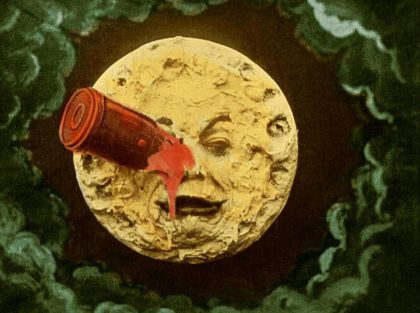 Science fiction in film goes back to the very beginnings of the medium, with A Trip to the Moon by Georges Méliès. This amazing short displays the optimism of the dawning of the 20th century with special effects that would become a backbone of the genre.
Science fiction in film goes back to the very beginnings of the medium, with A Trip to the Moon by Georges Méliès. This amazing short displays the optimism of the dawning of the 20th century with special effects that would become a backbone of the genre.
By 1927, the bloom was off the rose. With Fritz Lang’s Metropolis, we have the classic dystopian story, where the wealthy exert total control over society. They live in opulence above ground while the workers live in poverty below ground and toiling in mindless drudgery. But, son of the Master of Metropolis son falls in love with a radical schoolteacher named Maria and together they plot the destruction of the dystopia from the inside.
Lang, however, was a product of the German Expressionist movement that reflected the despair and economic collapse after the Great War. The Master of Metropolis creates a robotic double of Maria programmed to encourage violence and rioting, nearly thwarting the lovers’ plans.
Science fiction novelist H.G. Wells criticized the warning in Metropolis about the drudgery of technology, and questioned how technology could lead to such misery. Optimism about the future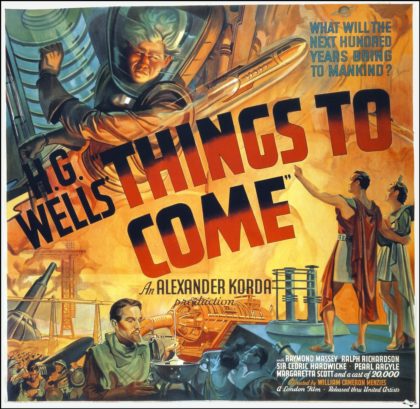 was a theme of Wells’ throughout his career. In 1936, the film Things to Come sought to portray the Wellsian view of social and political forces at work in the crafting of humanity’s destiny.
was a theme of Wells’ throughout his career. In 1936, the film Things to Come sought to portray the Wellsian view of social and political forces at work in the crafting of humanity’s destiny.
The film begins predicting the global war beginning in 1940. Unlike the real World War II, however, this war drags out over many decades until most of the people still alive do not even know who started it or why. Society has broken down into primitive, plague-ravaged localized communities ruled by totalitarian warlords.
One day a strange aircraft lands at one of these communities and its pilot tells of an organization rebuilding civilization. Great reconstruction takes place over the next few decades and society is once again great and strong. The world’s population now lives in glorious futuristic (even by our standards) cities. In 2035, on the eve of humanity’s first flight to the moon, a popular uprising against progress (which some people claim has caused the wars of the past) gains support and becomes violent, nearly destroying the aspirations of modern society.
In the decades since Things to Come, movies have depicted everything from Orwell’s nightmarish world of Nineteen Eighty-Four to the hopeful vision of the United Federation of Planets in the Star Trek universe. Many elements contribute to determining where on the social spectrum a projected organization of civilization resides. For instance, what is the overall quality of life experienced by the citizens? What level of freedom of expression is permitted? How much inequality exists?
One prime factor important to determining the nature of a society lies in the degree of centralized control and the capacity of the government to command obedience. This measure is not as easy to assess as one may think. For instance, the most totalitarian government may actually suit the needs of a majority of the population; in fact may have been voluntarily chosen through democratic means.
Dictators often arise because the existing social structure fails to address the most pressing needs of the people. One could argue that a centralized authority with limitless means to enforce its will may actually benefit a society spiraling out of control from economic depression, political paralysis, and lack of confidence by the people.
But if history teaches us anything, regardless of how beautiful the package, the contents always come with a hefty invoice – a bill payable only through blood and suffering. Tyrants can make many promises, and even fulfill some. In the end, however, the society finds that the price for accepting a deal with totalitarianism is the soul of the nation.
America has long suffered from lingering illnesses plaguing many of its people. But, these maladies have been largely limited to the so-called “lower classes.” Systemic poverty, institutionalized racism, and tacit acceptance of violence against minorities condemn millions of Americans to lives with few opportunities, social isolation, and little hope for the future.
In recent years, however, the virus long limited to the underprivileged in our nation began spreading. People with financial resources and status among majority populations now suffer from the symptoms of our country’s disease.
- Unchecked military expenditures in futile engagements in distant lands rob us of basic support systems of healthcare and social security;
- The influence of the wealthy eats away at our electoral process and perverts the legitimacy of our elected officials’ loyalties;
- Hostile foreign powers threaten the very process of free elections so critical to our democracy;
- Stagnant wages and sky-rocketing debts erode the middle class, undermining the peoples’ confidence in our system’s fairness; and
- Intolerant speech, sexual harassment, and blind dualism destroy the public discourse and further separate us from our neighbors.
So now, even the unoppressed among the people find themselves without a voice or a vote, victim of a corrupt elite.
 And in the midst of strife comes a white knight promising to cure the disease afflicting the people. Following the totalitarian playbook to the letter, the self-proclaimed savior promotes more violence, discredits every democratic process, and provides easy scapegoats for the problems of the social body. Truth becomes an early casualty in the battle for the national soul, and the white knight ascends to power, backed by the wealthy and most privileged members of society.
And in the midst of strife comes a white knight promising to cure the disease afflicting the people. Following the totalitarian playbook to the letter, the self-proclaimed savior promotes more violence, discredits every democratic process, and provides easy scapegoats for the problems of the social body. Truth becomes an early casualty in the battle for the national soul, and the white knight ascends to power, backed by the wealthy and most privileged members of society.
In November 2016, many of us suffered a traumatic experience that still sees us reeling on a daily basis. The election of Donald Trump seemed a death knell for civil rights, equal opportunity, public education, the environment, and a host of other progressive causes. But this is the illusion of the tyrant; as Gandhi said, “Remember that all through history, there have been tyrants and murderers, and for a time, they seem invincible. But in the end, they always fall. Always.”
And just as the Indians cast off their British overseers, and the American revolutionaries shed themselves of their bond to King George, it is the poor people who make the difference. For every Gandhi, there were a million impoverished Indians putting their lives on the line for freedom. For every Washington, there were a thousand sharecroppers and laborers standing their ground against the greatest military force of its day.
In 1967, the Rev. Dr. Martin Luther King, Jr. announced a plan to bring together poor people from across the country for a new march on Washington, demanding better jobs, better homes, better education – better lives than the ones they were living. King saw this Poor People’s Campaign as a fight by capable, hard workers against dehumanization, discrimination, and poverty wages in the richest country in the world.
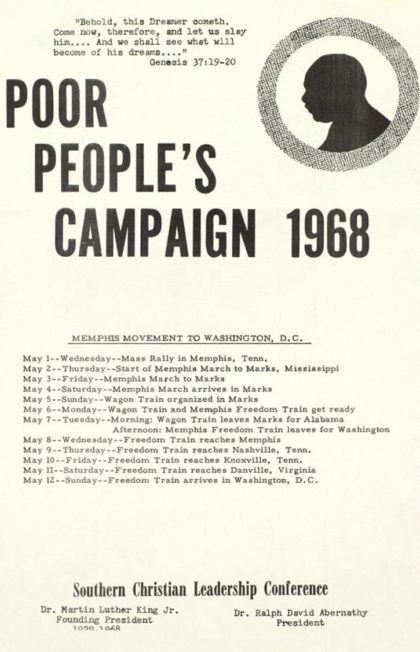 Dr. King held up the potential of the poor to come together to transform the whole of society. He knew that for the load of poverty to be lifted, the thinking and behavior of a critical mass of the American people would have to be changed. To accomplish this change of consciousness a “new and unsettling force” had to be formed. He argued that social transformation was not inevitable, arising solely out of the historic conditions, but rather needed the commitment, consciousness, capacity and connectedness of this “new and unsettling force” to build a credible and powerful campaign.
Dr. King held up the potential of the poor to come together to transform the whole of society. He knew that for the load of poverty to be lifted, the thinking and behavior of a critical mass of the American people would have to be changed. To accomplish this change of consciousness a “new and unsettling force” had to be formed. He argued that social transformation was not inevitable, arising solely out of the historic conditions, but rather needed the commitment, consciousness, capacity and connectedness of this “new and unsettling force” to build a credible and powerful campaign.
King’s assassination stalled the movement, but the core issues remained. Today, people once again feel the call to unite and challenge the forces that divide us, that impoverish us, that disempower us. Whatever your financial status, at this point in history we must ask ourselves basic questions.
- If I believe in helping the poor, isn’t my greatest contribution to dismantle the entities that make people poor?
- If I want to help the oppression, shouldn’t I find ways to disrupt the systems of oppression in our society?
- If I hope to promote unity, can my efforts best be put toward opposing the voices that seek to divide us?
A new movement under the leadership of the Rev. William Barber, the Poor People’s Campaign: A National Call for Moral Revival is uniting tens of thousands of people across the country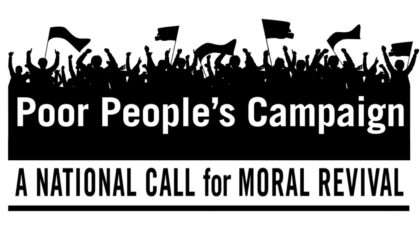 to challenge the evils of systemic racism, poverty, the war economy, ecological devastation and the nation’s distorted morality. This new Poor People’s Campaign is rooted in rooted in our deepest religious and constitutional values that demand justice for all and that a moral revival is necessary to save the heart and soul of our democracy.
to challenge the evils of systemic racism, poverty, the war economy, ecological devastation and the nation’s distorted morality. This new Poor People’s Campaign is rooted in rooted in our deepest religious and constitutional values that demand justice for all and that a moral revival is necessary to save the heart and soul of our democracy.
The movement seeks to build unity across all lines of division, promoting:
- dismantling of unjust criminalization systems that exploit poor communities and communities of color;
- transforming the “War Economy” into a “Peace Economy” that values all humanity;
- protecting everyone equally under the law;
- advocating that no one should live in poverty or die from poverty in the richest nation ever to exist;
- rejecting our distorted moral narrative to one concerned with how our society treats the poor, those on the margins, LGBTQIA folks, workers, immigrants, the disabled and the sick;
- building people-powered movements to transform the political, economic and moral structures of our society at every level; and
- putting our bodies on the line while embracing nonviolence.
This movement acknowledges that the effectiveness of marches and other forms of passive protest provide insufficient motivation for entrenched systems to change. Therefore, the Poor Peoples Campaign will lead 40 days of civil disobedience across the country starting on Mother’s Day and concluding on Juneteenth, the anniversary of the abolition of slavery in the United States. I serve on the South Carolina Steering Committee for the Campaign and hope that you will consider ways you can participate.
We live in an era of imperfect justice; our shortfall of compassion leaves us unable to empathize with the suffering of our neighbors; our thinking is tainted by privilege, which hampers our reason and will to struggle for the well-being of our fellow human beings. But we have seen the compassion and unlimited thinking among our youth in the past two weeks, calling upon our collective conscience and moral indignation to resist those who keep us captive to systemic evil.
The Poor Peoples Campaign calls upon us to hold our government accountable for fulfilling its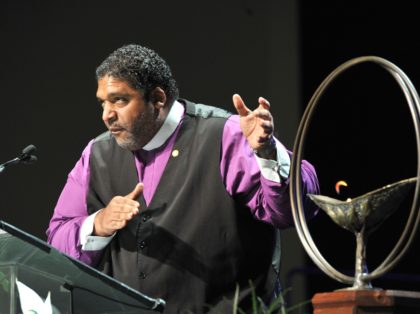 responsibility to ensure social justice; to demand that corporations value the liberation of human capacity and talents above the pursuit of profit as its own end; for those of us with privilege to accept that the plight of the poor is visited upon us as well; to accept that the oppressions faced by racial and religious minorities, women, immigrants, and others also bind us in chains and rob us of hope for a country we would be proud to call home. It calls upon us to see that the trauma we have experienced in the past year has long been familiar to the poor and oppressed, with whom we now share common cause.
responsibility to ensure social justice; to demand that corporations value the liberation of human capacity and talents above the pursuit of profit as its own end; for those of us with privilege to accept that the plight of the poor is visited upon us as well; to accept that the oppressions faced by racial and religious minorities, women, immigrants, and others also bind us in chains and rob us of hope for a country we would be proud to call home. It calls upon us to see that the trauma we have experienced in the past year has long been familiar to the poor and oppressed, with whom we now share common cause.
The media today displays no shortage of ominous visions of the future. Television show like Stranger Things, Black Mirror, and The Handmaid’s Tale depict how dark influences can affect society when the people fail to pay attention to the warning signs. But we need not be helpless victims of the monsters lurking in the shadows, or their avatars that visit us daily in news reports. We can realize that these evil creatures have plagued the poor and the vulnerable for centuries, even if we only now see them for ourselves. We can commit to standing united against these forces, saying “Never Again.”
Our nation stands on the brink of a revolution. Some will wait and watch as the forces of populism, nativism, and totalitarianism march in faux-patriotic fervor over our most cherished principles. But, we can dissent, we can resist, we can join our brothers and sisters pledging to overthrow the corrupt, the immoral, the purveyors of fear and ignorance, and those who provide the financial support for systems of white supremacy and fascism. We can empower the spirit of our youth – their courage, their will, and their imagination – to cure the ills of this nation. Together, we will overcome the propagandists, the fanatics, and the power brokers seeking to sacrifice our society to false gods. Together, we can stop the seeming inevitable spiral downward before we take one more step down the road of decadence and destruction.
Prayerful Reflection
Spirit of life and love that we know by many names, be with us as we enter an attitude of reflection, meditation, and prayer.
The body of this great nation suffers from a worsening moral infection. The symptoms of this disease include lethargy, muscle weakness, exhaustion, severe nausea, and headaches. Over time, paralysis can set in leading to eventual death.
The key to treating this illness lies in strengthening our heart; building the stamina and the courage to adopt a rigorous course of therapy and lifestyle changes. Religious community can be an enormously effective prescription.
During his 2016 speech before the Democratic National Convention, the Rev. Dr. William Barber said, “I’m troubled by the way faith is cynically used by some to serve hate, fear, racism, and greed. When religion is used to camouflage meanness, we know that we have a heart problem in America…We are called on to be the moral defibrillators of our time.”
May we have the courage to brave the disapproval of others, the censure of our colleagues, and the wrath of some in our society. If we find this courage to at as the moral defibrillators for the heart of this nation, we will find allies in every town, city, and state of America.
Blessed be. Amen. Let it be so.
Closing Words
From “Nonviolence and Social Change” by Martin Luther King, Jr.
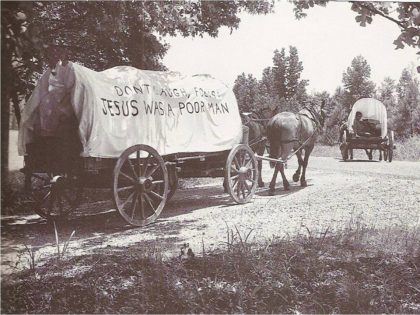
There are millions of poor people in this country who have very little, or even nothing to lose. If they can be helped to take action together, they will do so with a freedom and a power that will be a new and unsettling force in our complacent national life.
